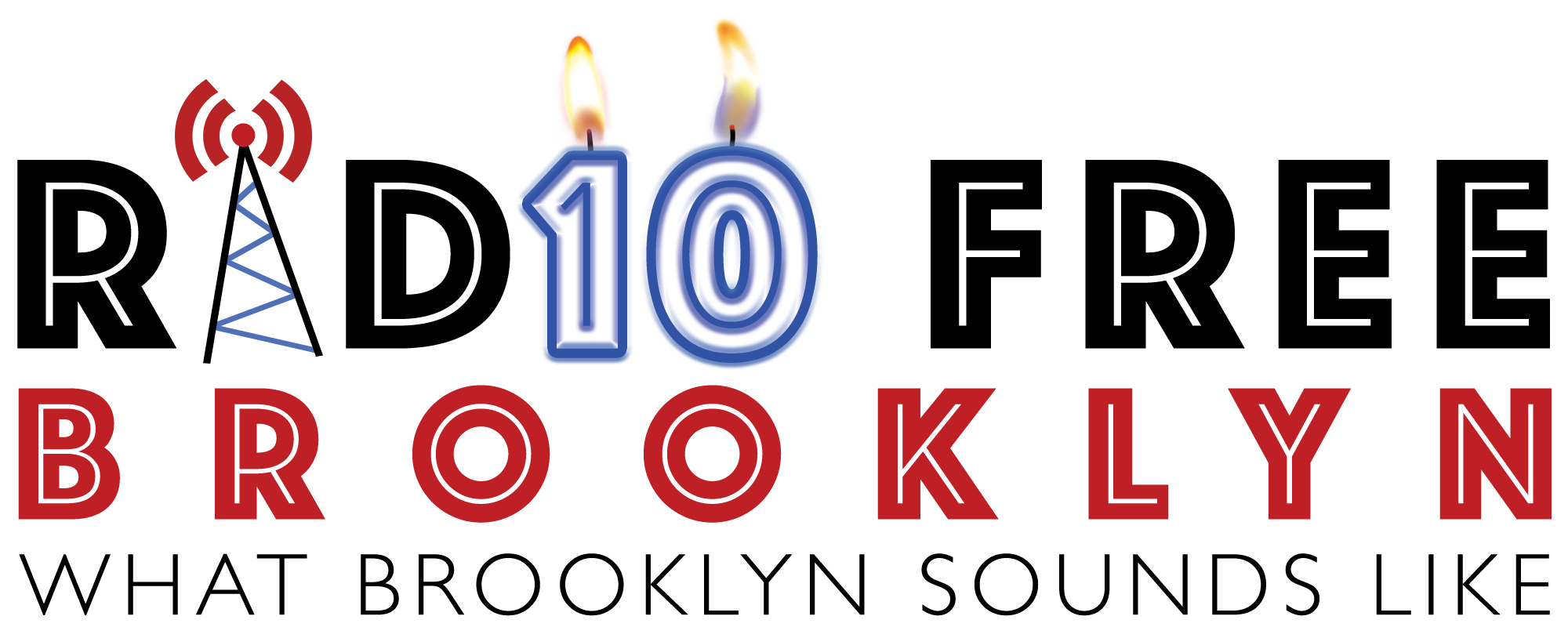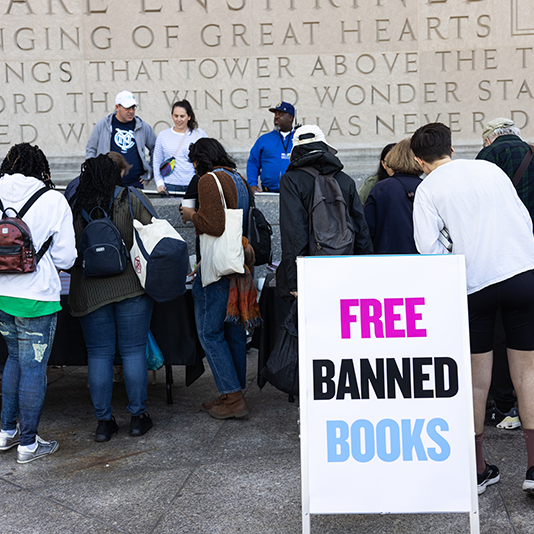Radio Free Brooklyn spoke with organizers from both the Brooklyn and New York Public Libraries about their contributions to the Freedom to Read Day of Action in October, the first nationwide rally against book bans.
Published in 2005, Justin Richardon’s children’s book “And Tango Makes Three” follows the story of Roy and Silo, two male penguins at the Central Park Zoo. The pair are inseparable, and when staff notice them attempting to build a nest together, they decide to help. Zookeepers provide the pair with an egg to hatch, and the female chick is eventually named Tango. Based on a true story, this picture book represents the diversity possible in relationships and highlights that families should be valued in any form they take.
Every ten years, The American Library Association (ALA) curates a list of the 100 most frequently challenged books of the decade. A challenged book is one that has experienced an attempt to remove or restrict it because of an objection made by a particular person or group, while a banned book has been removed from circulation. A challenge is not just a person expressing their point of view but an attempt to remove material from a curriculum or library and restrict others from accessing it. The ALA says most challenges are unsuccessful, and the school or library collection retains most materials.
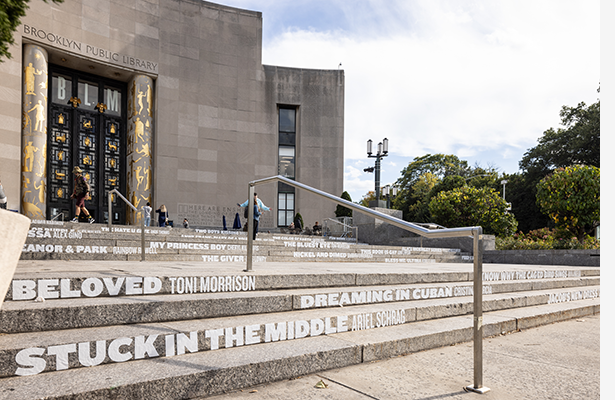
ALA staff review public and confidential censorship reports from libraries, schools, and the media to compile the challenged book lists. From 2000 to 2009, “And Tango Makes Three” was the country’s fourth most frequently challenged book. From 2010 to 2019, it was sixth.
The Office for Intellectual Freedom at the ALA has been documenting attempts to ban books in libraries and schools since 1990. Many state legislatures have tried to remove books from shelves for decades. Titles that represent LGBTQ+ people, queer relationships, and nontraditional families are especially susceptible to restriction.
While challenging books is not new, aggressive legislation passed in Florida and Texas in 2022 brought the issue forward. During the 2022-2023 school year, nearly half of the school districts in Florida banned books. A report by PEN America, a nonprofit organization advocating for free speech, states that in 2022, school administrators in Texas banned 801 books across 22 school districts, and 174 titles were banned at least twice between July 2021 and June 2022.
The report found that 1,648 unique titles were banned in schools nationwide in 2022. Of these titles, 41% address LGBTQ themes or have LGBTQ protagonists or prominent secondary characters. Another 40% contain protagonists or prominent secondary characters of color.
Recent data from the organization found that book bans nearly tripled during the 2023-2024 school year, with over 10,000 instances. About 8,000 bans were recorded in Florida and Iowa alone, primarily because of state legislation. Following trends of previous years, a majority of the banned titles featured stories with people or characters of color and/or LGBTQ+ people. Additionally, the bans have increasingly targeted stories by and about women and girls and/or depictions of rape or sexual abuse.
While not directly affected by the bans, the New York Public Library (NYPL) and the Brooklyn Public Library (BPL) have been some of the loudest voices in opposition to the bans and for the protection of intellectual freedom. In conversation with Radio Free Brooklyn, Jennifer Fermino, the Vice President for Communications and Marketing at NYPL, and Fritzi Bodenheimer, Press and Media Relations Officer for BPL, shared what it has been like to create a national campaign against book bans.
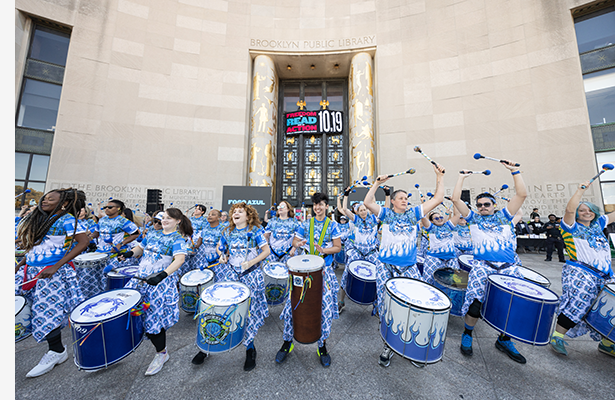
On October 19, 2024, the New York Public Library, the Brooklyn Public Library, and the Queens Public Library worked together to create the first-ever nationwide Freedom to Read Day of Action. The event was a coordinated set of rallies held by almost 200 libraries in nearly all 50 states to support the freedom to read. The day was organized in partnership with the American Library Association and the Association for Rural and Small Libraries.
Fermino said this is the first national event NYPL has ever done, and it took a lot of organizing to make it a reality. Each participating library held its own event with speakers, music, and activities for community members to participate in. At the Stephen A. Schwarzman branch on Fifth Avenue, there was a DJ performance on the steps, banners hanging on all sides that read, “Freedom to Read,” and book giveaways. There were also speeches from activists and authors, including drag icon Sasha Velour, City Council Member Carlina Rivera, a 17-year-old student activist Da’Taeveyon Daniels, and NYPL President Anthony W. Marx.
New York City residents Peter Parnell and Justin Richardson, co-authors of the banned book “And Tango Makes Three,” also spoke at the event. The two have been together since 1994 and live in Manhattan with their daughter.
“A lot of people were thankful they were putting a spotlight on the issue,” Fermino said, “Polls show people don’t like book bans. It’s a small group of people deciding what the majority should read,” she said.
The speakers and performances at the Brooklyn Public Library included the Fogo Azul NYC drumline, the Resistance Revival Chorus, Professor Eric Klinenberg, Executive Director of the National Coalition Against Censorship Lee Rowland, singer Jessy Tomsko, and many others.
Other library systems participating in Freedom to Read Day of Action include the Phoenix Public Library, Boston Public Library, LA County Library, San Francisco Public Library, and the Hartford Public Library. Each system had its own program dedicated to sharing the negative implications of banning books. A complete list of the participating systems is available on the United Against Book Bans website.
Despite the scale of this nationwide event, the Freedom to Read Day of Action was not the first anti-censorship project for either of the New York City library systems. Bodenheimer said that in April 2022, the Brooklyn Public Library launched Books Unbanned, an online program that provides young people across the country access to an online catalog of thousands of regularly challenged books.
“It doesn’t matter where in the country you live. If you have a Books Unbanned card, you have free access to over half a million items,” Bodenheimer says.
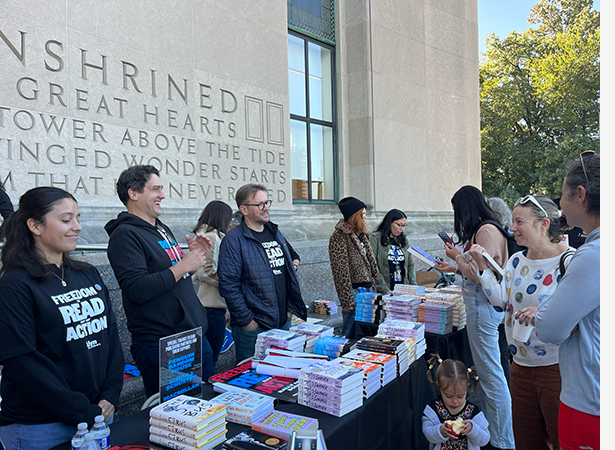
The Book Unbanned website also features access to “Borrowed and Banned,” a podcast mini-series that delves into the political and ideological history around published media, Intellectual Freedom Teen Meetups, virtual spaces where teens can connect with peers to discuss book challenges, censorship, and intellectual freedom, and the BookMatch program which offers book recommendations by teens, for teens.
The program’s success speaks for itself. Bodenheimer stated that nearly 9,000 young people from all 50 states have requested a Books Unbanned digital eCard, and those thousands of participants have checked out nearly 300,000 items.
“We’re delighted to provide that kind of access, but we’re also heartbroken that we have to,” she said.
Bodenheimer discussed Books Unbanned and said the program caters to young adults because many challenged books are for people aged 13 to 21. Many of the challenged works also feature people of color or LGBTQ+ characters.
“If you’re a young person, this is the time you’re thinking about your identity and figuring out who you are. If all the books about a specific piece of your identity are taken off the shelf, it sends the message that that is wrong,” she explained.
Continuing, “It’s a pillar of democracy that you are allowed to access information from all points of view. We have to fight with all our might to make sure that democracy is kept intact.”
Books Unbanned has expanded to the Boston Public Library, the Los Angeles County Library, the Seattle Public Library, and the San Diego Public Library.
At the New York Public Library, the research wing has been a pinnacle of a global effort to protect the freedom to read. The “Banned: Censorship and the Freedom to Read” exhibition highlights the library’s efforts to fight censorship over the last century. The online exhibition explores censorship in the United States through four themed sections: Literature and Film, Sexual and Reproductive Freedom, Archiving Against Censorship and White Supremacy, and War, Colonialism, and Protest. The program is accompanied by a curriculum guide and temporary displays of material in the Stephen A. Schwarzman Building, the main library branch on Fifth Avenue.
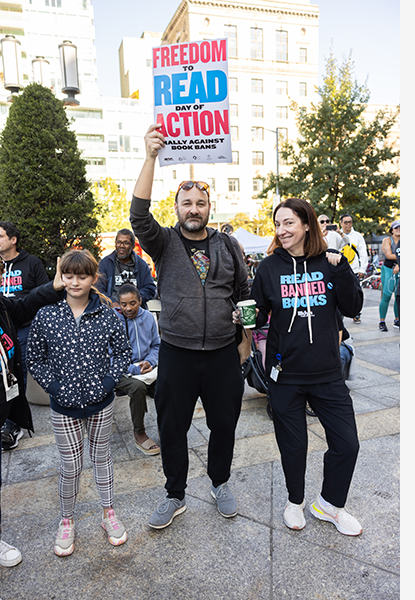
Each section features library materials that display the modern reality of censorship. Some works available to view are manuscripts, letters, novels and periodicals, photographs, and artwork. The exhibit is a continuation of NYPL’s 1980 exhibition titled, “Censorship: 500 Years of Conflict.” A week before its opening, Toni Morrison—a frequently banned and challenged author—spoke at the library and conveyed how public libraries led to her discovery of the freedom she found in reading.
About 40 years earlier, in 1942, the library launched the “Books the Nazis Banned” exhibit. At the opening, New York City Council President Newbold Morris, said: “Our great public library system is the first line of defense against tyranny.”
“Intellectual freedom is a non-partisan right, and our efforts at NYPL aim to preserve that,” Fermino said.
Both libraries said there’s one easy way to support the movement: go to the library! Getting a library card, checking out books, and spending time at your local brand strengthens the system. The more people utilize library amenities, the easier it is for staff to show regulators how vital their services are.
Bodenheimer said that even though this election season is over, there will be others. Getting involved in your local community, considering libraries when deciding who to vote for, and making your voice heard at the voting booth are all ways to do your part.
“In New York, we have the privilege to have very few book bans, but it affects all of us when one-sided information is provided anywhere in the country,” she concluded.
PHOTOS: The New York Public Library/Jonathan Blanc
